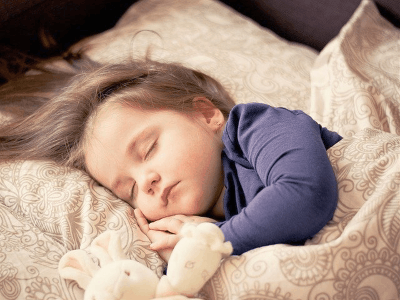Seeing as how we spend a third of our lives sleeping, there must be a good reason why sleep is so important. If you’ve been cutting down on your shuteye time to be able to get everything else done, your mind and body will soon start experiencing the consequences of your actions. One of the aspects of leading a healthy lifestyle is proper sleep. But why is sleeping imperative, and how can you get more of it?
Keep on reading for a helpful guide that will teach you all about the stages and all the fantastic benefits of sleeping, how much sleeping we actually need and how to get it, and what can happen if we don’t sleep enough.
What are the stages of sleep?

First of all, let’s familiarize ourselves with what happens to our bodies when we are sleeping. The body progresses through four stages of sleep.
- Stage one is non-REM sleep which occurs when we first fall asleep. The heart rate, brain waves, as well as eye movements all slow down as we enter light sleep. This phase typically lasts around 7 minutes.
- The second stage is also non-REM sleep which is actually the light nap that occurs just before deep sleeping. During this phase, our body temperature goes down, eye movements stop, and muscles and heart rate continue to relax. The brain waves spike briefly and slow down again. We spend the most sleep time in stage 2.
- While stage three is still non-REM sleep, this is where deep sleep begins. We don’t move our eyes, and muscles and brain waves further slow down. Deep sleeping is essential as it has a vital function. Here, our bodies replenish energy and repair cells, tissues, and muscles, which helps us feel refreshed the next day.
- The last stage is REM sleep, and it typically happens 90 minutes after we fall asleep. The eyes move quickly while brain waves, heart rate, and breathing all speed up as well. This is the stage when dreaming often happens. Moreover, our brains process information during this phase, meaning that it is crucial for learning and memory.
It’s also essential to note that we go through this cycle of four phases multiple times during the night, generally between four and five times and that each cycle can last from 70 to 120 minutes.
How much sleep do we need?

The amount of sleep we want depends on our age, and it can vary from person to person. However, some guidelines recommend that:
- Babies of up to 12 months need somewhere between 12 and 17 hours of sleep per 24 hours, including naps.
- Toddlers from one to about five years should sleep for 10 to 14 hours a day. 6- to 12-year-olds are recommended 9 to 12 hours of sleeping.
- When it comes to teenagers, 8 to 10 hours should be enough.
- While adults from 18 to 60 should strive for at least seven hours of sleeping.
- Individuals that are 61 and up typically need 7 to 9 hours of sleeping.
Why is sleep so important?

Now that you know what the body goes through during sleep and how much you need, you should understand why proper shuteye is so important.
While scientists don’t fully understand why we need sleep, it is widely accepted that sleeping is necessary for various biological reasons.
It helps us conserve energy.
One theory is that sleep helps us conserve energy. According to research, as we reduce our caloric needs when we sleep; eight hours of sleeping can save 35% more energy than complete wakefulness.
This theory suggests that sleeping is used to reduce our energy use and not to have to go hunting for food during the night when it’s more inconvenient and less efficient.
It helps the body restore itself.
Then, the restorative theory states that sleep is essential for the body to be able to restore itself. During sleeping, your cells are given time to repair and regrow.
Hormone release, muscle repair, protein synthesis, and tissue growth all happen during sleep, supporting this theory.
It’s necessary for brain function.
The brain plasticity theory claims that sleep allows our nerve cells to reorganize. When we sleep, the glymphatic (waste clearance) system clears the central nervous system of waste and removes toxic byproducts that accumulate during the day.
It’s suggested that this process contributes to turning short-term memories into long-term ones and erasing unnecessary information that might clutter our nervous system.
Other brain functions like learning, problem-solving, creativity, and concentration are all affected by sleeping as well.
It’s vital for our emotional health.
Research also shows that sleep and emotional health are linked. While sleeping disturbances can lead to mental health issues. Mental health issues can also lead to difficulties when it comes to sleeping. With that in mind, getting enough sleeping can help our brain regulate emotions and support emotional stability.
For example, the amygdala is one part of the brain in which activity is increased during sleeping. As it is in charge of how we respond to fear, not getting enough sleep can result in overreactions.
It plays a role in weight maintenance.
Sleeping controls hunger hormones as well. For example, ghrelin, which increases appetite, is decreased when we sleep as we use less energy, while leptin, a hormone that helps us feel full after eating, increases.
On the other hand, if you don’t sleep enough, ghrelin is elevated and leptin suppressed; which makes us hungry and puts us at risk of eating more and gaining weight.
Moreover, obesity, metabolic syndrome, and type 2 diabetes can all be associated with as few as five consecutive nights of poor sleeping.
It improves heart health.
Although scientists are unsure of the causes, it’s believed that sleep is good for heart health.
Less than 7 hours of sleep is connected to risk factors for heart disease such as high blood pressure, increased inflammation, elevated cortisol levels, and insulin resistance.
How to get enough sleep?
As it can take four days to recover from just one hour of lost sleep, according to a 2016 study, it’s vital that you don’t try to replace lost sleeping but get enough of it in the first place.
To start with, you want to cut down on some bad habits that you might have. For instance, working out right before turning in for the day and sleeping in a room that is too hot can all affect the quality of your sleeping.
You can consider adjusting your sleeping environment by investing in a mattress topper that will be able to regulate your body temperature naturally and adding some relaxing scents in the form of lavender or chamomile oil diffusers.
In addition, steering clear of screens for at least an hour before bedtime can also help you fall asleep faster.
Then, drinking too much alcohol before going to bed can also interfere with your sleep cycle, especially REM sleeping; meaning that you will not feel refreshed in the morning.
Moreover, caffeine and food that is too high in fat, sugar, and protein can all lead to a bad night’s sleep.
What can happen if we don’t sleep enough?
If we don’t get enough sleep, the body will have a difficult time when it comes to fulfilling all its functions properly.
For example, sleep deprivation can have countless effects on the body, including mood changes, anxiety, depression, fatigue, problems with memory and concentration, poor motor function, weight gain, weakened immune system, and many more.
Furthermore, sleeping deficiency is associated with chronic health issues that affect the heart, brain, blood, and kidneys. Additionally, poor sleeping is linked to an increased risk of falls and broken bones in older adults.
What is more, a lack of sleeping can lead to various other accidents that increase the risk of injury. For instance, driving when drowsy can result in vehicular accidents, serious injuries, and even death.
With a total of this information in mind, it’s easy to see why getting enough sleep is essential. If you are currently experiencing sleeping issues; consider changing your sleeping environment and abandoning some bad habits that might affect your sleeping quality.
Images by Claudio_Scott, Daniela Dimitrova, samuel Lee and Enrique Meseguer


Comments are closed.